I should have known that something was afoot when this was the first image we focused on in this week's episode, called "Souvenir." Suggesting that he hasn't let go of his quest to understand the "Negro" market, Pete "The Weasel" Campbell sits at his desk reading Ebony. It's August, we soon find out, as his secretary reminds him she has plans for the weekend and Ken Cosgrove makes a particularly Sterling-esque comment about hirsute women cooling themselves in fountains. With their characteristic time jolt, the writers not only serve to clue us in to the setting immediately (and it's importance to the world they've created) but also to the props, in this case, a magazine. An actual remnant of an actual time.
It's not hard to track down Campbell's issue of Ebony. The cover image is clear enough. Shirley Bassey is on the cover wearing one of that era's iconic gown/pants/dresses. The issue is from March of 1963 (a souvenir?). Sure, maybe the producers just had this copy lying around (it's chock full of ads, the first of which is for the perfect old-fashioned using I.W. Harper bourbon), but I don't believe in coincidences on this show. There is good journalism in this issue, as Jezebel writer Anna Holmes points out (read it. It's crazy. This is what lifestyle magazine's used to look like). The issue is chock full of nods to the up-coming civil rights and feminist movements including a feature on Cassius Clay and "feminist power" Eunice Adabunu (I love how Ebony's style guide has them refer to Adabunu as Mme.) By this point in August, the September issue of Ebony would have been on stands, and that issue was particularly momentus, as it celebrated to 100th Anniversary of the Emancipation Proclimation. This revelation works to show that Pete is not as much interested in finding common ground with African Americans as he is in learning about them from an outsider's perspective.
Also accomplished by this scene: we know that Pete is home alone. "I don't know why a man on his own is an object of pity when it's them we should be feeling sorry for," says Pete when he learns of his secretary's plans to spend a weekend with the girls. "I don't feel sorry for those girls," says Harry Crane, "they do whatever they want." For the first time, we see the men's side of domestic doldrums. Harry Crane wishes for a freer existence, one in which he's not tied down by his wife, who he sees as overbearing (and has cheated on). Pete stands up and announces, "I'll take anyone for a drink who wants one," indicating that he's bored and lonely, and pretty much views his wife (whom he's cheated on) as a way to stay occupied on the weekends when he's not working.
And he can barely do that. Pete eats cereal. Pete watches T.V. Pete comes home drunk one night, struggles out of his shirt, and doesn't even glimpse at himself in the mirror that was the symbol of his soul searching last season when he learned of the child he fathered with Peggy. Pete takes out the garbage. It's at the garbage chute that Pete meets Gertrude, the German au pair employed by his neighbors, whom he's never met. Gertrude is beside herself about the Bonwit Teller dress she ruined. Pete offers to help her. I was screaming at the T.V. "Don't trust him!" much to dismay of my upstairs neighbors, I'm sure.
On his quest to "help" Gertrude, Pete goes to Bonwit Teller where he is waited on by none other than Joan. She's as surprised as I was:
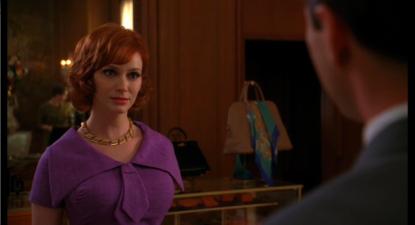
She's been exiled to the Republic of Dresses, as Pete calls it, but she's still covering for the slimeballs she used to work for. "This never happened," she winks when Pete asks her to be discrete about the dress, which he lies and days is for Trudy. Joan let's him know she knows it's not: "I can't see Trudy in a ten…" We're reminded of her husband, the crappy rapist doctor, who she says wants to go into psychiatry, a field that would not require him to use his hands. She's bummed:
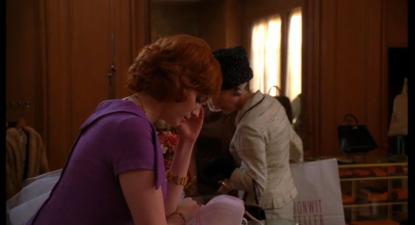
Joan's position is even less authoritative than it once was. She has dominion over the Republic of Dresses. Her subjects were "skirts," before, but at least they had legs in them. Her work has now been reduced to delegating empty articles of clothing, and she's ashamed and angry.
Joan hooks Pete up with a new dress, free of charge, and he comes knocking on Gertrude's door like the conquering hero. He insults her, diminishing her heritage to some alcoholic beverages, illustrating his ignorance of any culture but his own: "You're German, right? I could get some beer? Reisling? Schnapps?" "You're very nice," she replies, "but I have my boyfriend." She didn't ask for his help, which she mistook for kindness, but she is grateful. Clearly, this isn't enough for Pete. He feels jilted, cheated even. He goes home, gets a little drunk, and comes back.
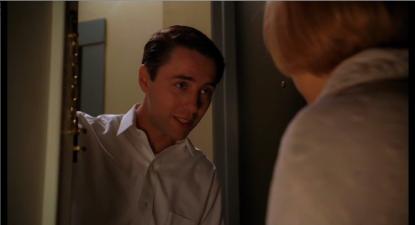
"I went through a lot of trouble to help you with your dress problem," leers Pete as he hangs in her doorway with this creepy look on his face, "The least you could do is let me see it on you." Gertrude reluctantly lets him in. She leads him to her room. "I'll go get the dress," she says. She's put it away, hoping that the whole ordeal was over. But it isn't. Pete prevents her from leaving the room. "I'd like to kiss you," he says." He forces himself on her.
There has been a lot of discussion about whether or not this was rape. Really? On this show? Joan's rape was given much the same treatment, but it was rape. And this was rape. Gertrude felt forced to have sex with Pete. He knew something about her she wished to keep secret. Her wards were sleeping in the next room. Who was going to believe her over him? Extoring money is the same as stealing. Extorting sex is the same as rape.
Pete later blames the whole thing on his wife ("I don't want you going out of town without me anymore"), and only feels bad because another man, Gertrude's employer, points out how stupid he was, using don't-crap-where-you-sleep logic. Pete is officially a weasel-rapist. I rest my case.
Meanwhile, Betty is revived, briefly. She and the other members of the Junior League have brought their petitions to the city council. Betty gets really excited when Henry Francis walks in:
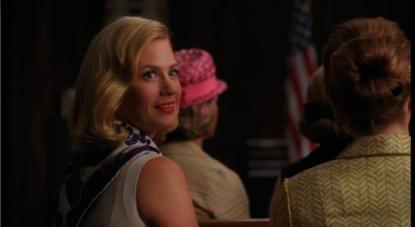
After Henry helps the Junior League delay the construction of a water tower that would blemish their town's natural beauty, Henry walks Betty to her car, rather, her father's car (a souvenir?). After a moment of heightened tenderness, the likes of which Betty hasn't seen from Don in what probably seems like ages, Henry leans in and kisses her. Unlike Pete's awkward attack of Gertrude, Betty clearly kisses Henry back:
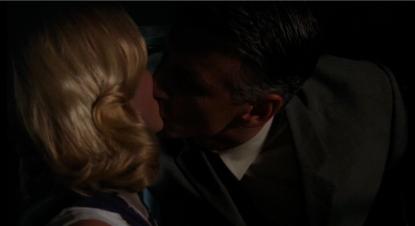
She goes home thrilled. She is literally dancing:
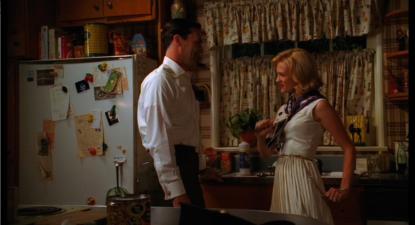
And she parrots Henry's political-speak from their time together earlier in the evening. "When you don't have the power to do something, you have to delay things," she explains to Don. It seems he can barely believe what he's hearing.
That night, Betty tells Don she wants to accompany him to Rome, the next stop on Connie Hilton's world tour. Besides harkening back to Grampa Gene's reading sessions with Sally, during which they read The Decline and Fall of the Roman Empire, the Drapers' trip to Rome references a predominant piece of Roman culture in the '60s: La Dolce Vita. Fellini's film came out only three years before the show takes place, and Betty's almost instant status after landing in Rome as a Blonde with Big hair in a Black dress forces us to compare the themes of this episode, and series for that matter, with the themes of that film:
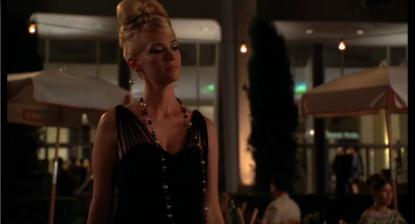
Though she's not trapsing around in a fountain, the film's main theme of searching for happiness and love that won't come is underlined by Betty's temporary elation in this episode. She and Don arrive in Rome, and instantly, she feels important. The first cigarette she takes out is lit by a passing man. This makes Betty smile.
Shortly after, we see Betty and Don in their hotel room. Betty, we find out, is fluent in Italian:
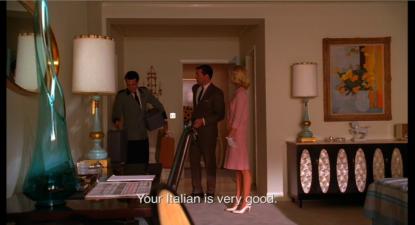
"We all have skills we don't use," she said last week. It seems in Betty's case, still, barely emotive waters run deep.
Don tips the bellhop two dollars. "Two dollars, Don?" says Betty. "That's more than he makes in a week," she, it seems, knows the customs and the appearance of American opulence. It's true. The custom of tipping in Europe and other countries is seen as insulting, a sign that the tipper is better than the tipee. Betty's aware of this while Don isn't. He's perplexed by this dynamic:
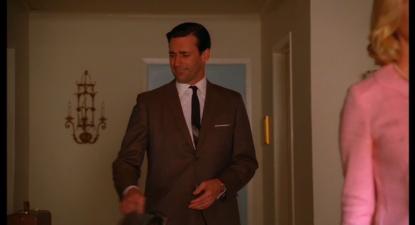
And only moments later, Betty surprises Don again. The phone rings. "Pronto," she answers, using the common Italian greeting. It's Connie Hilton. She more than holds her own with the magnate, making small talk and not giving the phone to Don. She hangs up and flits off, like it's nothing. Don looks at her like he's never seen her before. Like he doesn't know, or forgot about, this side of her:
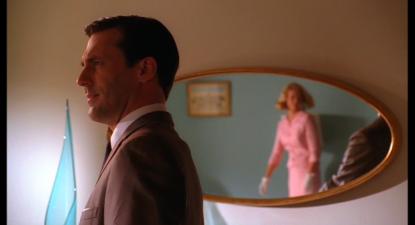
Again, she looks like she's dancing, floating, comfortable, confident. This is what she's meant to be doing, rubbing shoulders and holding her own. Even Don, the unimpressable, is impressed.
He's turned on by her, and she's turned on by her sudden power over him. "No," she shakes her head when Connie Hilton beckons them to breakfast, "stay." Don, who'd previously been flying all over the world at the whim of Connie now listens to his wife. She's content:
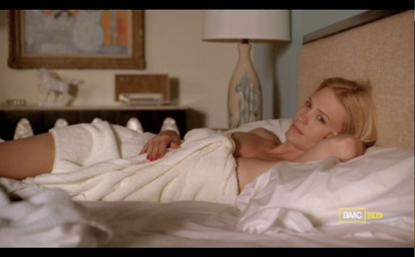
Before this, in sexual situations, Don was the aggressor. Now, Peggy follows him into the bathroom and drops her towel. She wants more, so she's going to get it. Though the producers cut away, I'm sure she does.
But, as Don says when they return home, their Roman holiday was "short and sweet." The next morning, Betty is dressed in what looks like a Missoni dress (a souvenir from her trip?). Don lights her cigarette:
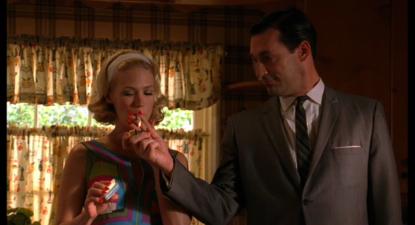
This makes Betty smile. But soon she is left alone with her kids, their sole form of discipline (Don makes himself scarce when Carla explains how Sally misbehaved), and her fainting couch, a reminder (a souvenir?) of her kiss with Henry. It does prompt a rare and sensitive moment with Sally, who has taken to immitating her mother's preening:
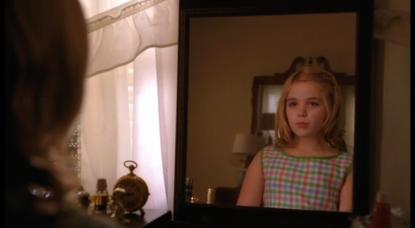
But her advice is, "You don't kiss boys, boys kiss you," despite her sexually aggressive behavior in Rome. Betty is reverting back to her old ways.
That night, Betty makes lasagna for dinner and serves it with a block of parmesan cheese (a souvenir?):
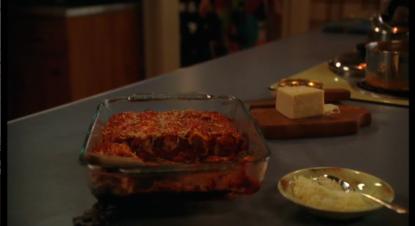
She later shuns Don's gift, a trifle, really. A tiny charm that looks like the Colosseum (ironic, right?). "I hate this place," she tells him. "I hate our friends, I hate this town," Betty is unable to adequately express herself here, when she was perfectly capable of doing so in a foreign language. She reverts to a childlike state, but that is because she is treated like a child, given trinkets. "Now I'll have something to look at when I tell the story of the time we went to Rome," she says, clearly unhappy with the gift. Don is confused, unaware of what he's done (which, of course, is why Betty is so upset). The Colusseum has been reduced to the size of a hazelnut. Don has reduced their time in Rome, and his brief view of her as something other than a wife and a mother, to a souvenir.


